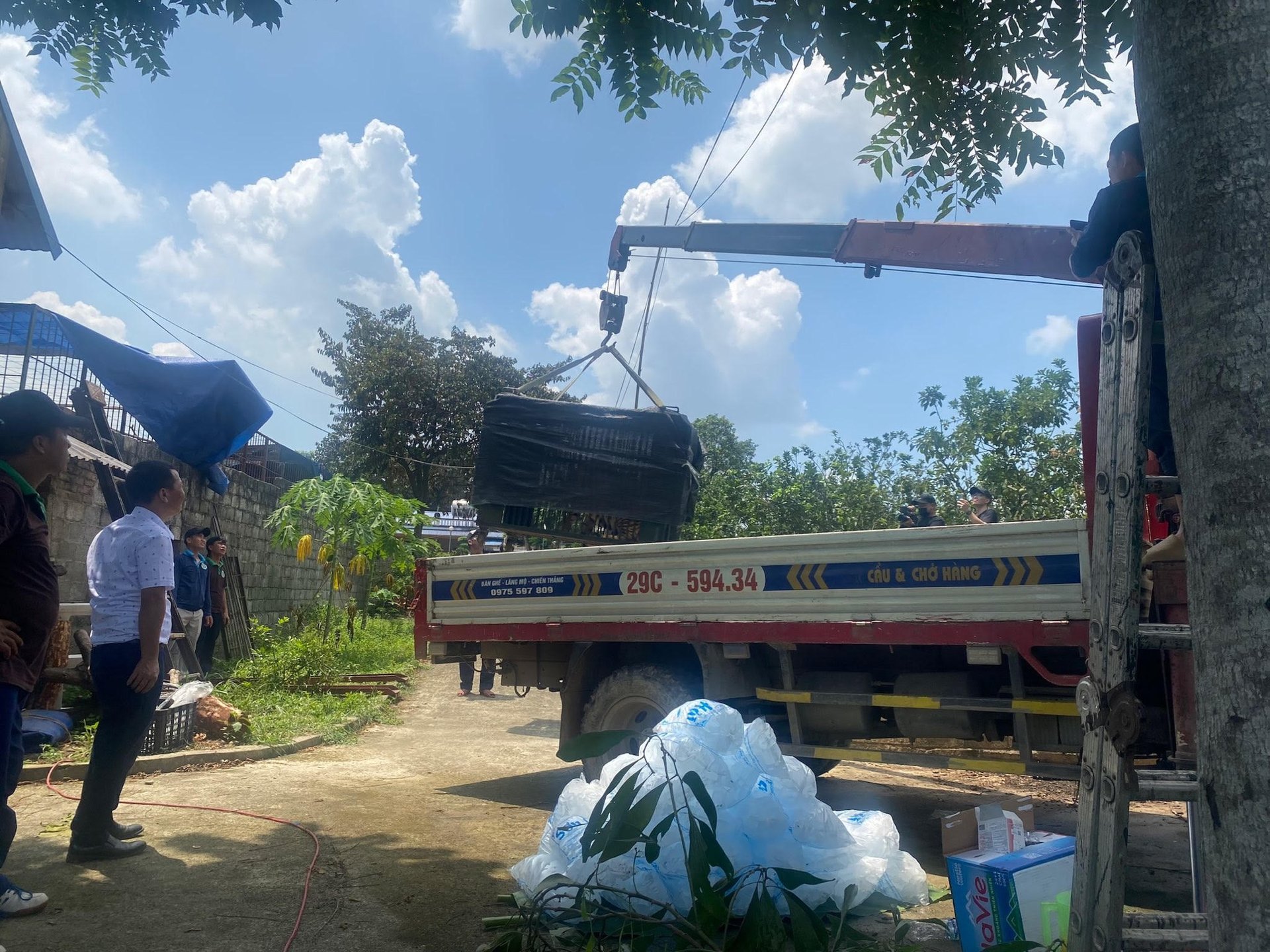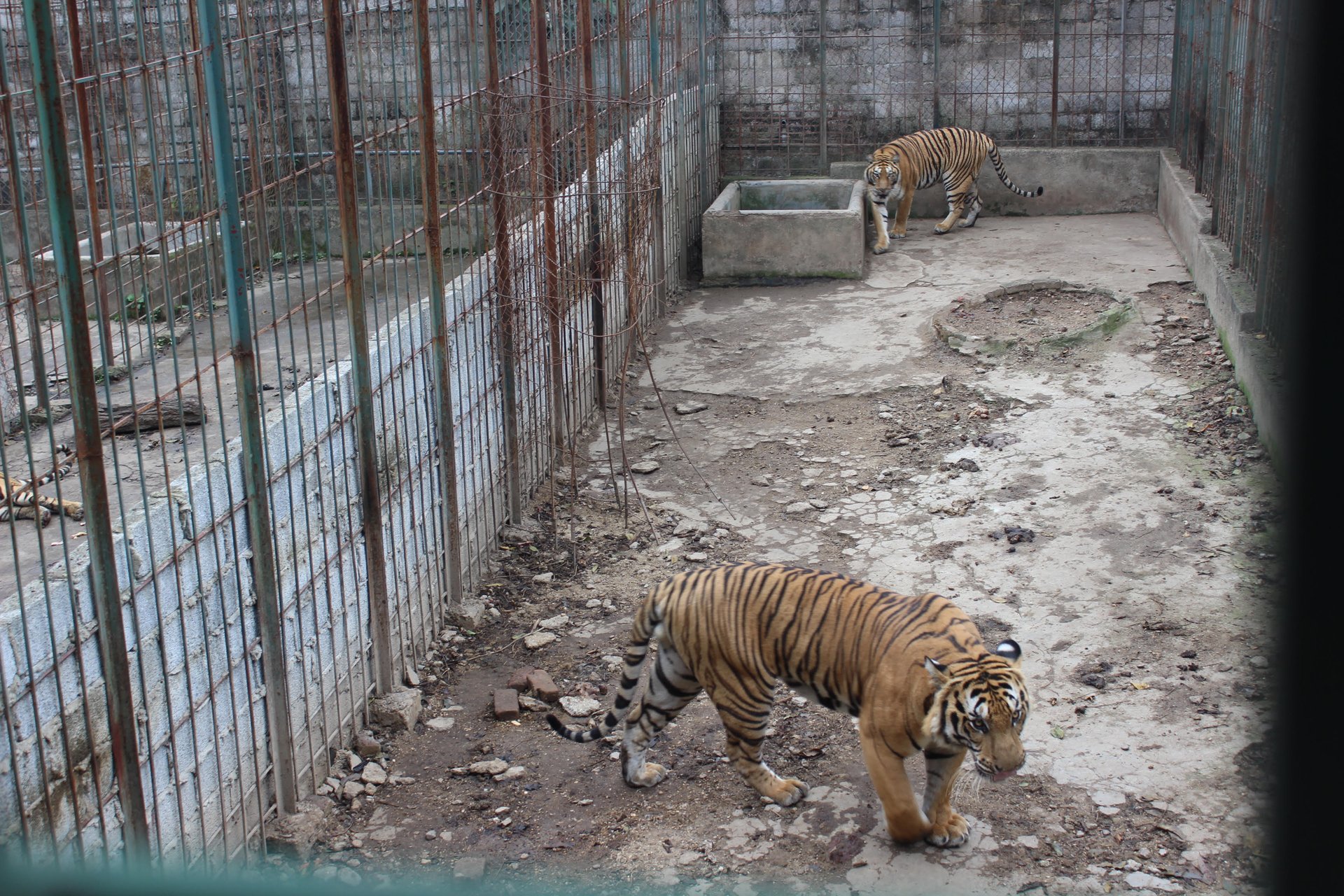November 27, 2025 | 16:06 GMT +7
November 27, 2025 | 16:06 GMT +7
Hotline: 0913.378.918
November 27, 2025 | 16:06 GMT +7
Hotline: 0913.378.918
On June 7th, the Thai Nguyen Provincial and Municipal Subdepartments of Forest Protection, in conjunction with the Hanoi Forest Protection Department, Hanoi Wildlife Rescue Center, and the People's Committee of Hanoi, were presented with 6 tigers that were willingly handed over by Nguyen Khac Thuong from Thinh Dan commune, Thai Nguyen City, Thai Nguyen province.
The aforementioned outcome is a productive consequence of the constant advocacy efforts of the Thai Nguyen Provincial Forest Protection Department, Thai Nguyen City Forest Protection Department, pertinent agencies, and notably, the proprietor's consciousness. The Hanoi Wildlife Rescue Center will provide care for the entirety of the six tigers.

Receiving and transferring tigers to the rescue center.
On April 4, 2007, in response to reports of illegal captive tiger operations in Binh Duong province, the Prime Minister issued document No. 1761/VPCP – NN, which approved the Ministry of Agriculture and Rural Development's proposal to entrust the illegal captive tigers to households for the purpose of "pilot breeding for the purpose of conservation."
In the same year, the competent authorities in Thai Nguyen province detected an illegal captive facility belonging to Nguyen Khac Thuong. Following the issuance of a decision to impose sanctions for an administrative violation committed by Thuong in relation to illegal tiger farming, similar to the cases of tiger farming in Binh Duong, the authorities of Thai Nguyen province have assigned his household to continue piloting the conservation of these tigers. Since 2016, Thuong's farm has consistently maintained a captive tiger population of six individuals.
According to Nguyen Khac Thuong, he has been brought up these tigers for almost two decades and gained a deep sense of affection towards them. As a result of insufficient health and unfavorable economic circumstances, he made the decision to hand over custody of these individuals to the State with the hope that they will receive better care.
According to Ms. Bui Thi Ha, the Deputy Director of Education for Nature (ENV), Thuong's voluntary delivery of tigers is acknowledged with respect. Additionally, the efforts of the local authorities, particularly the Thai Nguyen Provincial FPD, in mobilizing and persuading households, as well as promptly carrying out necessary procedures for the handover, are appreciated. The pilot farming initiatives implemented in select households since 2007 have not yielded any significant results in terms of tiger conservation in their natural habitat. ENV expresses its expectation that the competent State entities will quickly determine the course of action for the pilot tigers subsequent to the evaluation process in compliance with the guidelines stipulated in Directive No. 29/CT-TTg, issued on July 23, 2020 by the Prime Minister, with the objective of promptly resolving this pilot effort.
As per the data available on the ENV database, the current count of tigers held in captivity across the nation's registered private facilities, including private farms and zoos, has exceeded 300 as of April 2023. The current number of registered captive tigers in Vietnam has exhibited an almost six-fold increase in comparison to the figures documented in 2007, which accounted for over 50 individuals.

Tigers in the household of Nguyen Khac Thuong.
After conducting an assessment of captive tigers and wildlife activities at these establishments over an extended period, ENV has determined that the facilities demonstrate an essential adherence to legal regulations. Despite this, certain establishments continue to engage in the illegal trade of tigers and wildlife by hiding their activities within non-commercial wildlife farming facilities.
The ENV recommends that proficient State agencies establish and issue legal provisions to proficiently regulate non-commercial wildlife farming facilities, with a particular emphasis on restricting the reproductive activities of wild animals. Some individuals are collected from populations of endangered, precious, and rare wildlife in limited quantities for the purposes of conservation and education.
According to the Director of the Hanoi Wildlife Rescue Center, Mr. Luong Xuan Hong, tigers are a rare and endangered species of wildlife that are afforded the highest level of protection under the law. In order to engage in the rearing of tigers for educational or conservation objectives, it is imperative to guarantee suitable expertise, infrastructure, technological advancements, veterinary care, and animal welfare measures. In natural habitats, typically, the activities of every individual tiger range between 20 and 30 kilometers. It is imperative to safeguard tigers and other wildlife in their natural habitats. The practice of captive breeding of tigers in domestic settings without proper adherence to prescribed conditions not only results in the loss of natural habits among tigers but also has the potential to break legal regulations.
On the afternoon of June 7th, a total of four tigers were transported to Soc Son, Hanoi. At present, the Hanoi Wildlife Rescue Center is implementing requisite strategies to entice the remaining two tigers for transportation. It is anticipated that the delivery will be finalized by the 8th of June.
Upon the acquisition of these six additional tigers, the Hanoi Wildlife Rescue Center will become the designated facility responsible for the upkeep of a total of 41 tigers.
Translated by Linh Linh

(VAN) On the morning of November 27 in Beijing, Minister Tran Duc Thang and the Deputy Commissioner General of the General Administration of Customs of China signed a protocol on fresh jackfruit exports.

(VAN) As floodwaters recede, a vast network of irrigation works across eastern Gia Lai is emerging in a state of severe disrepair, with extensive damage demanding urgent restoration ahead of the 2025-2026 winter-spring cropping season.

(VAN) The conference reviewing three years of implementing Decision 911 identified the need to prioritize improving marine environmental quality and promoting sustainable fisheries development.

(VAN) Le Hoai Trung, Member of the Communist Party of Viet Nam Central Committee and Minister of Foreign Affairs, held talks with Vi Thao, Chairman of the Guangxi Zhuang Autonomous Region (China) this week.

(VAN) The Mekong River Commission adopts the 2026 - 2030 Strategic Plan with a people-centered approach.
/2025/11/26/1720-1-200855_132.jpg)
(VAN) Viet Nam and Japan have many conditions to expand cooperation on climate change adaptation, particularly in disaster risk management based on advanced technologies.

(VAN) The strong development of digital technology and artificial intelligence is opening up opportunities to transform science and technology into a 'Magic eye' for disaster forecasting and early warning.